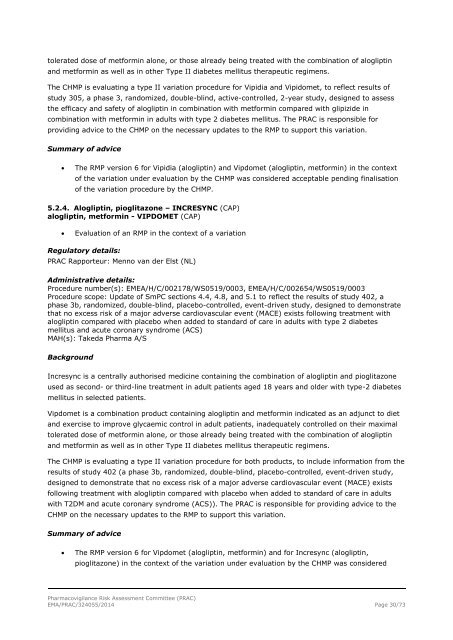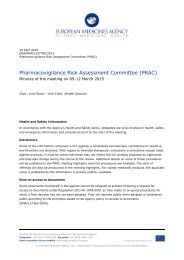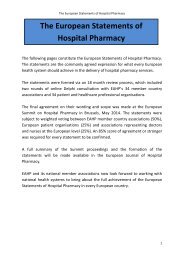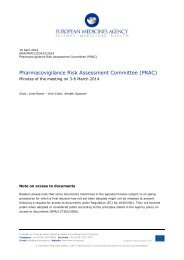WC500169468
WC500169468
WC500169468
Create successful ePaper yourself
Turn your PDF publications into a flip-book with our unique Google optimized e-Paper software.
tolerated dose of metformin alone, or those already being treated with the combination of alogliptin<br />
and metformin as well as in other Type II diabetes mellitus therapeutic regimens.<br />
The CHMP is evaluating a type II variation procedure for Vipidia and Vipidomet, to reflect results of<br />
study 305, a phase 3, randomized, double-blind, active-controlled, 2-year study, designed to assess<br />
the efficacy and safety of alogliptin in combination with metformin compared with glipizide in<br />
combination with metformin in adults with type 2 diabetes mellitus. The PRAC is responsible for<br />
providing advice to the CHMP on the necessary updates to the RMP to support this variation.<br />
Summary of advice<br />
<br />
The RMP version 6 for Vipidia (alogliptin) and Vipdomet (alogliptin, metformin) in the context<br />
of the variation under evaluation by the CHMP was considered acceptable pending finalisation<br />
of the variation procedure by the CHMP.<br />
5.2.4. Alogliptin, pioglitazone – INCRESYNC (CAP)<br />
alogliptin, metformin - VIPDOMET (CAP)<br />
<br />
Evaluation of an RMP in the context of a variation<br />
Regulatory details:<br />
PRAC Rapporteur: Menno van der Elst (NL)<br />
Administrative details:<br />
Procedure number(s): EMEA/H/C/002178/WS0519/0003, EMEA/H/C/002654/WS0519/0003<br />
Procedure scope: Update of SmPC sections 4.4, 4.8, and 5.1 to reflect the results of study 402, a<br />
phase 3b, randomized, double-blind, placebo-controlled, event-driven study, designed to demonstrate<br />
that no excess risk of a major adverse cardiovascular event (MACE) exists following treatment with<br />
alogliptin compared with placebo when added to standard of care in adults with type 2 diabetes<br />
mellitus and acute coronary syndrome (ACS)<br />
MAH(s): Takeda Pharma A/S<br />
Background<br />
Incresync is a centrally authorised medicine containing the combination of alogliptin and pioglitazone<br />
used as second- or third-line treatment in adult patients aged 18 years and older with type-2 diabetes<br />
mellitus in selected patients.<br />
Vipdomet is a combination product containing alogliptin and metformin indicated as an adjunct to diet<br />
and exercise to improve glycaemic control in adult patients, inadequately controlled on their maximal<br />
tolerated dose of metformin alone, or those already being treated with the combination of alogliptin<br />
and metformin as well as in other Type II diabetes mellitus therapeutic regimens.<br />
The CHMP is evaluating a type II variation procedure for both products, to include information from the<br />
results of study 402 (a phase 3b, randomized, double-blind, placebo-controlled, event-driven study,<br />
designed to demonstrate that no excess risk of a major adverse cardiovascular event (MACE) exists<br />
following treatment with alogliptin compared with placebo when added to standard of care in adults<br />
with T2DM and acute coronary syndrome (ACS)). The PRAC is responsible for providing advice to the<br />
CHMP on the necessary updates to the RMP to support this variation.<br />
Summary of advice<br />
<br />
The RMP version 6 for Vipdomet (alogliptin, metformin) and for Incresync (alogliptin,<br />
pioglitazone) in the context of the variation under evaluation by the CHMP was considered<br />
Pharmacovigilance Risk Assessment Committee (PRAC)<br />
EMA/PRAC/324055/2014 Page 30/73








